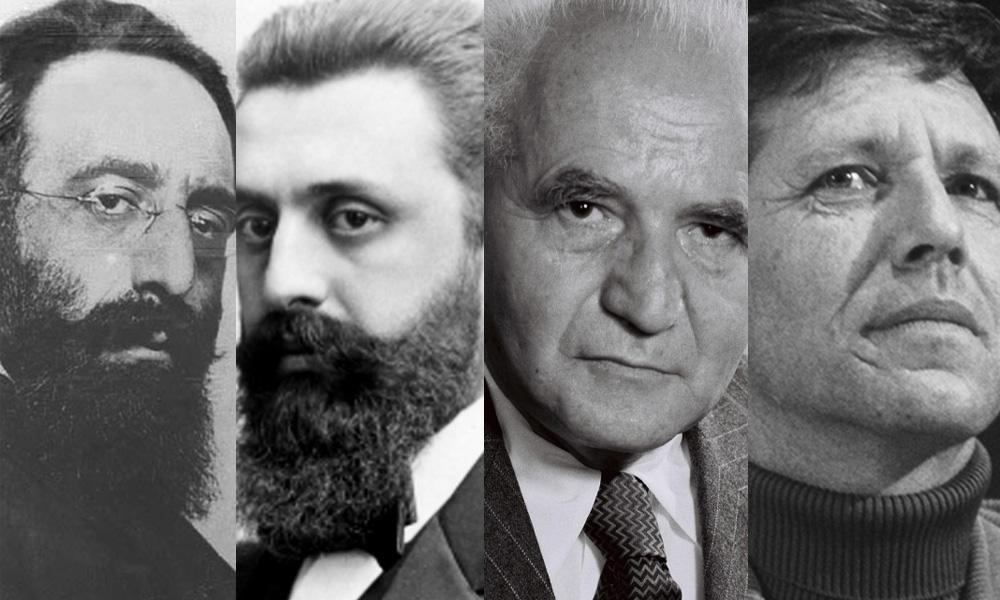Why don’t you give up on the word ‘Zionism’?” a non-Israeli friend asked me the other day. “It is confusing, it means contradictory things, and it draws hate. Antisemites use it as a virtuous code word for their hatred of Jews. It has become a bad word.”
Well, friend, I understand your bafflement, but Zionism can’t be summarily canceled. It is part of the personal identity of 10-20 million people in the world. Many of them, but certainly not all, are Israelis. Most, but certainly not all, are Jewish. They interpret the concept in different ways, but anyone telling you “I detest Zionists, not Jews” must face the fact that a majority of Jews in the world are, in the basic sense, Zionists. Deal with it.
Coined by Jewish-Austrian thinker Nathan Birnbaum in 1890 and made famous by Theodor Herzl less than a decade later at the First Zionist Congress held in 1897, the term “Zionism” was contested from its very beginning. At its most fundamental, it simply says that Jews are entitled to a national home in their ancestral land.
But as the Jewish national movement emerged, the term was constructively vague, open to different interpretations by different Jews. The Zionist movement quickly became a loose federation of Jewish dreams, hopes and plans. Socialist, middle-class, religious or nationalist—all came together under a moderate mainstream. That was one secret of its astounding success.
[Moment Debate: Has the word Zionism outlived its usefulness?]
In post-1948 terms, legally endorsed by the international community, Zionism merely means that the State of Israel’s right to exist and flourish is equal to that of any other country. As long as this right is contested, Zionism’s mission is not over.
Note that this basic definition of Zionism does not exclude fully equal rights for Arab citizens of Israel. It does not exclude an independent Palestinian state next door to Israel. It does not aspire to shape Israel’s final borders. Nor does it define Israel’s type of government, although until the recent rise of Benjamin Netanyahu’s ultra-right government, democracy was its mainstream consensus.
What about colonialism? Despite its pioneers’ European origins, Zionism is not, and never was, a colonialist project. Jews had lived in the Land of Israel/Palestine in unbroken continuity ever since the Roman Empire sent most of their brethren to exile. There were waves of Jewish immigration, consciously returning to the ancestral homeland. Inspired by modern nationalism (rather than modern imperialism), the 19th-century Zionists made this trickle into a river. By their own lights, they didn’t come to conquer, nor to colonize; they came home, they came to work hard with their own hands, and they mostly came to live in peace with their Arab neighbors.
In recent years, postcolonial discourse gone berserk has tilted this story. But no matter how “white” the half-million European Jewish immigrants may have looked in the streets of Haifa and Jaffa in the early 20th century, they did not show up there armed to the teeth, supported by a European army, in the name of a colonial power. Nor did they have any homeland to return to after 1939: By then, all of them were refugees who had narrowly escaped genocide.
Moreover, before and especially after 1948, the half-million European migrants were joined by more than 600,000 non-white Jews ousted from Arab and Muslim countries. More than half of today’s Israeli Jews are of Middle Eastern origin and came to escape violence and death in Morocco, Algeria, Iraq, Yemen and Iran. Try telling that to the trolls who demand that we Israelis “return to Poland and Germany.”
A touching truth that I wasn’t taught in school is that many, perhaps even most, members of the founding generation of Israel were not even Zionists, just refugees—people who escaped with only the clothes on their backs from countries that had become killing fields for Jews.
For them, Zionism was not colonialism but a life raft. And not just any life raft, but one carrying a very long historical memory of geographic belonging. Perhaps due to this cultural energy, Zionism has been one of the most effective life rafts in modern history. It still is, even after October 7.
And why not share your life raft with others? At its core, Zionism was once happy with Jewish and Arab co-citizenship. It never intended to create Arab refugees, but to find a haven for Jewish refugees. David Ben-Gurion said in 1918 that the very idea of evicting Arab residents of the land was “a harmful, reactionary mirage.” Israel’s Declaration of Independence puts this more positively, announcing full civil equality to its Arab citizens, offering peace and neighborliness to the Arab countries. A national homeland for Jews, and a democracy for all its citizens.
This ideal might have worked out—we can’t know for sure, of course—had the Palestinian leadership and the Arab countries accepted UN Resolution 181 of November 1947, dividing the land into an Israel and a Palestine. Instead, Palestinian militias immediately attacked Jewish civilians, followed by the 1948 invasion by five Arab armies. This mistake was enormously detrimental for the Palestinians, but not only for them: The young State of Israel was born legally, but with blood on its hands. However peaceful the intention of its mainstream had been, the Zionist movement was forced to fulfill its goal by war. This was not part of Herzl’s dream.
“Zionism has always been a family name,” my father used to say. He painted its rainbow of conflicting horizons with gentle irony: a socialist utopia, a Jewish bourgeois Jerusalem of red roofs and good manners, a nationalist return to the kingdom of David, a liberal-democratic light unto the nations, an ultra-Orthodox copy-paste from the shtetl under bluer skies. As variegated as the Jewish people itself.
Disastrously, some of these versions have today become corrosively extreme. The right-wing Revisionist Zionism, in which Jabotinsky and Begin ardently coupled nationalism with liberalism and equal rights, has fallen into the trap of Jewish superiority with expansionist, racist and violent streaks. To Israel’s shame, this current is now powerfully present in Netanyahu’s government.
Please know that Herzl’s version of Zionism is still alive: a liberal-democratic country, a home for the Jewish nation and for all its citizens. Significantly, this prophet of the State of Israel didn’t call it a Jewish state but a State of the Jews (Judenstaat). The Jews in his writings are individual human beings and modern citizens, not a mystical collective entity. His solution is political and earthly, not messianic. Herzl strongly emphasized that every non-Jewish citizen would have complete civil equality and take an active part in public and political life. A prominent Palestinian couple (though the word “Palestinian” in that sense did not yet exist), a proud and opinionated man and woman, are central figures in his futuristic novel Altneuland.
In fact, Herzl’s Zionism, which Ben-Gurion embraced and which a good half of Israeli Jews still embrace today, is so moderate that anti-Zionists find it hard to attack him. Some of them cling to one vague line in one of his private papers, others pander fake claims. Herzl’s stance of civil liberalism and equal rights is almost unassailable.
My own Zionism has a name, too. I wish it were used more often. I am a humanist Zionist.
Humanist Zionism, in my definition, stems from Herzl’s brand of Zionism, plus a combination of social democratic Zionism and moderate religious Zionism. It resonates most clearly through Israel’s Declaration of Independence, which hailed “the ethics of the Prophets” in their most universalist form, as values Judaism contributed to civilization.
Humanist Zionism is the reason for my choice to keep using the term “Zionism” as part of my values and worldview. It is also the legacy of every Israeli who rallied, between January and October 2023, to oppose the Netanyahu coalition’s onslaught against the Supreme Court, aiming to undermine its role as the defender of (mostly Arab) minorities.
Whether they know it or not, humanist Zionism is also the intellectual basis for every single person still hoping to see a two-state solution following the monstrous October 7 massacre by Hamas. And because it is a humanist worldview, this solution is conditional on a future Palestine—and indeed, a future Israel—led by peace-seeking moderates.
The new antisemitic tsunami cannot hide its ugly face behind an “anti-Zionist” façade as long as humanist Zionism exists. Among the numerous ideologies pitched against one another in today’s turbulent world, the idea of a state for the Jews and all its citizens, alongside a stable Palestine, offers what humanist Zionism has always given us: a morally worthwhile cause.
Fania Oz-Salzberger is an Israeli essayist, political activist and history professor emerita at the University of Haifa. Her books include Israelis in Berlin and, with Amos Oz, Jews and Words.




2 thoughts on “Opinion | A Quick Guide to Zionism in Hard Times”
Go Israel. As a Christian I stand with Israel all the way, God’s chosen people and nation. This is a war between good and evil and I would do all I can to support God’s people and so should the real Christians of Gaza and the surrounding Arab nations.Israel will be the true leader of the world and messiah yeshua will help and lead them to be a blessing to the world. Stay courageous and brave Israel the world needs you.
I have full respect for the Oz family, their fight for a peaceful Israel has lead some of us to fight for the same aspiration.
Now the issue at stake here is the labeling of the early pioneers, here again in this article the mention of white Jews Europeans and non- white Jews, lovers of Zion, joining the young country, Israel.
Describing how the nonwhite Jews as fleeing from persecution and violence??
What may have been true for Iraquí Jews is not true for others such as the Moroccan Jews.
Isn’t it time to stop using labels,, generalizations and opt for a different kind of language.
Promoting diversity would be such a novelty . When will the Academia understand it, study your facts and change your approach.
It will be the greatest effort to make and will bring tremendous changes when dealing with peace and the conflict Israeli- Arab.